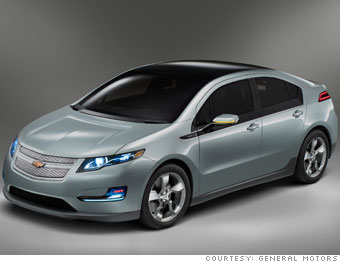
Volt from GM
Recently, Chevy announced its upcoming Volt, a hybrid-electric vehicle which it claims gets an equivalent of 230 mpg, according to a yet-to-be-finalized EPA formula for estimating fuel efficiency of hybrid vehicles. Unlike other hybrid vehicles such as Ford's Fusion or Toyota's Prius, the Volt is designed to run all the time off the on-board batteries, which hold 16 kilowatt hours, with a small gas-driven generator kicking on once the batteries dip below 8 kilowatt hours of remaining charge. It's extended range, as a result of the on-board generator, is about 340 miles. The Volt has sporty styling and good performance, and represents a big jump in fuel efficiency compared to existing vehicles on the road. Two potential drawbacks are life of the battery and the initial cost of the vehicle, which GM is setting near $40,000, initially.
Nissan has also entered the market with a fully electric vehicle, called the Leaf. Using the same yet-to-be-finalized formula, the Leaf's "fuel efficiency" equates to a whopping 367 mpg. The Leaf uses a 24 kwh lithium-ion battery, giving it a range of 100 miles. It's styling is nice, although less sporty, but it has the added advantage that Nissan is pricing it in a much more affordable range. Nissan executives claim the sticker price will be comparable to a nicely apportioned "C-segment" compact car (which would put it somewhere in the $20,000 - $30,000 range).
Both of these vehicles are predicated on the fact that the majority of traveling most car owners do are short commutes to and from work or shopping. The inherent strategy being banked on by both companies is that for buyers whose daily commute is 80 miles or less, round-trip, the extremely high fuel efficiency of either vehicle will be too good to pass up.
And, just for some added comparison, let's look at the fuel-efficiency of a few other comparable vehicles--
* Volkswagen Jetta TDi -- 30 city / 41 highway
* Toyota Prius -- 51 city / 48 highway
* Ford Fusion -- 41 city / 36 highway
* Toyota Yaris (gas) -- 29 city / 36 highway
* Toyota Yaris (diesel) -- 68.9 combined (not avail. in the US)
The question is whether or not the Volt's 230 mpg or the Leaf's 367 mpg figures are reasonable or meaningful. We tend to use "miles per gallon" as a comparative figure for fuel-efficiency, because we always have, but this opens the comparison up for some game playing. For the Volt, any extended driving beyond the 40-mile range involves extensive running of the generator, and the fuel efficiency of the vehicle drops down into the 50-100 mpg range, depending on the distance driven. For the Leaf, driving beyond the 100 mile range isn't even a possibility, unless the vehicle became ubiquitous enough for Nissan or its partners to provide battery-swapping stations-- a strategy Nissan has said it won't adopt in the US (presumably due to the sheer geographic area that would need to be covered).
Given a mixture of driving ranges, GM estimates the cost-per-mile in fuel of driving the Volt would equate to somewhere between 2 and 3 cents per mile. (The Leaf purports to cost about 2 cents per mile). GM is, of course, highlighting this claim by making a comparison to a vehicle getting 20 miles per gallon at (and I've seen various figures given) somwhere between $2.75/gallon and $3.60/gallon. Their claim is that the average driver pays 15 cents per mile compared to the Volt's less-than 3 cents per mile. A more useful comparison would be with vehicles with which the Volt would be expected to compete, such as the Prius or Fusion.
* Volt -- 2.5 cents per mile
* Leaf -- 2.2 cents per mile
* Prius -- 5.4 cents per mile
* Fusion -- 6.7 cents per mile
* Yaris (diesel) -- 3.9 cents per mile
AT roughly 3 cents per mile better cost performance, the Volt would save something on the order of $360/year over the Toyota Prius. But when you consider the difference in sticker price of the two vehicles (roughly $15,000), you'd need to drive the Volt for far beyond the life of the vehicle to make up the difference in cost. Nissan is on much firmer ground, here, with the Leaf, if its sticker price comes in anywhere near that of the Prius. And, of course, from purely a cost perspective, neither vehicle fairs as dazzlingly well when compared to a vehicle such as the diesel Yaris, which if it were sold in the US, would be priced around $17,000 dollars while delivering near comparable performance based on technology which is already proven.
I applaud both GM and Nissan for moving hybrid and PEV technology forward. Both vehicles are viable choices in today's marketplace. But I'd caution anyone tempted to fall for the hype about hundreds of miles per gallon fuel efficiency that those figures are not based on the actual cost per mile of real world driving. While both vehicles represent a step forward in fuel efficiency (and I mean total fuel efficiency), neither represents the order-of-magnitude advance being claimed by their developers.
See the original on http://iarnuocon.newsvine.com/_news/2009/08/16/3157412-chevy-volt-nissan-leaf-and-fun-with-car-math



No comments:
Post a Comment